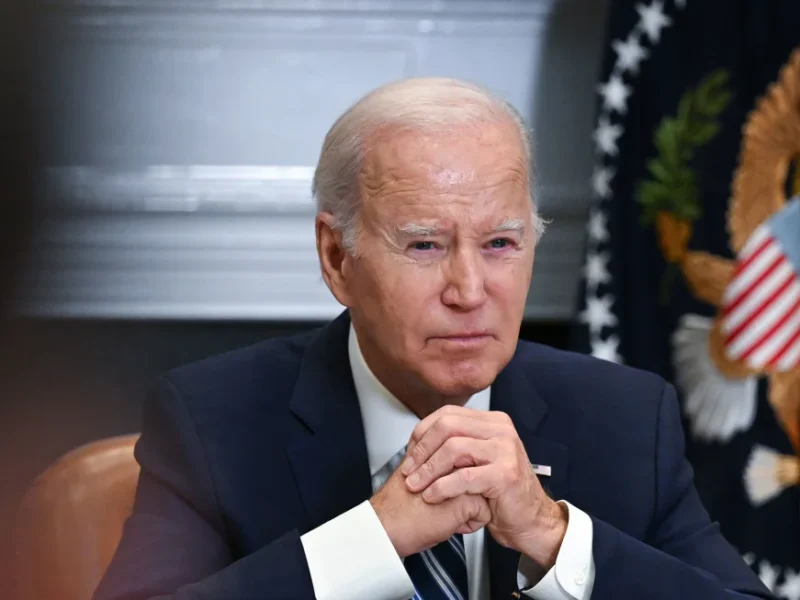In a recent speech to a group of Democratic donors at a Washington hotel, President Joe Biden emphasized the significant amount of his recent time dedicated to addressing a turbulent global landscape.
He estimated that approximately 75% of his responsibilities involve engaging with foreign leaders and traveling worldwide. While the accuracy of this estimate was questioned by his aides, given the intense focus on diplomacy in recent times, Biden’s statement highlighted a pressing challenge for him and his team: how to balance responding to two ongoing international conflicts that have polarized Americans and consumed a considerable portion of their time, all while simultaneously running a campaign critical to the future of American democracy.
Despite these international challenges, most polls indicate that foreign policy is not a top concern for most Americans. Historically, incumbent leaders have faced political difficulties and even lost elections when voters perceive them as overly preoccupied with foreign issues rather than domestic ones. The volatile nature of current foreign conflicts, such as the uncertain outcome of the war in Ukraine and the potential for a wider conflict in the Middle East, makes it impossible to predict their impact on the November elections.
White House officials acknowledge the difficulty in forecasting how much of Biden’s time will be spent dealing with foreign conflicts as the year progresses, emphasizing that the President’s schedule is a delicate balancing act. While the President will continue to hold events focusing on priorities for voters, such as reducing fees and drug costs, marquee moments like the State of the Union address and campaign stops will also be used to articulate his agenda, including the importance of preserving democracy.
Even as Biden shifts his attention toward the election campaign, potentially spending less time in the Situation Room, the substantial national security apparatus within the White House will remain committed to addressing international concerns. While fewer overseas trips are expected this year as the President focuses on campaigning, some major summits are still on the agenda.
Biden’s team is preparing for unexpected developments, drawing lessons from past elections, like the shift in voter interest from the Iraq War to economic concerns in 2008, which demonstrates how rapidly new issues can reshape a campaign’s direction.
The President’s aides generally view his intensive diplomatic efforts positively, especially in contrast to the chaotic global presence of his predecessor, Donald Trump. They also recognize a connection between his foreign and domestic agendas, particularly regarding efforts to safeguard democracy.
However, despite their efforts to highlight Biden’s diplomacy as evidence of his extensive experience as a statesman, there are no plans to make his global efforts the central focus of his campaign. This is despite Biden investing substantial political capital in leading the American response to conflicts in Ukraine and Israel, including urging Congress to allocate additional funds for Ukraine and supporting Israel, which has led to some divisions among progressive factions. The situation in both conflicts remains unpredictable, with potential shifts in the coming months.
US authorities say both wars are presently entering basic stages, with American help to Kyiv presently at hazard of drying up and as the White House observes closely for signs that Israel is moving to a more surgical stage of its attack on Gaza.
How each struggle will see in November is inconceivable to foresee. Biden’s associates accept Israel’s campaign to dispense with Hamas seem take months, in the event that not a long time. In Ukraine, they recognize any exertion to reach a arranged settlement with Russia generally depends on the readiness of President Volodomyr Zelensky to concur to concessions — something he’s solidly rejected so distant.
Other stewing hotspots may moreover detonate to dominate the current ones, counting around Taiwan, the self-governing island where races will be held afterward this month. American authorities are closely observing how Beijing reacts.
What does appear clear is the outside things that expended Biden’s time in 2023 won’t be rapidly settled this year, and his endeavors to induce reelected will share time and vitality with an ever-more-complicated world.
Insights from the past
An incumbent president who wants to be reelected should be careful when dealing with other countries, as there are many examples of past presidents doing the same. Jimmy Carter tried to help free the people held by Iran, but he couldn’t do it before he lost the election in 1980. Because he couldn’t talk about it, people thought he couldn’t get things done.
George HW Bush was the 41st president of the United States from 1989 to 1993. Bush was in charge when the Cold War ended and the first Gulf War happened. But voters were more worried about not having jobs and the cost of things going up. His opponent, Bill Clinton, used this difference to his advantage.
Both Carter and Bush did not get re-elected for a second term.
Other presidents were better at getting Americans involved with other countries when they ran for president again. George W was the president of the United States. Bush won the election again in 2004, even though there were two wars going on in Iraq and Afghanistan that the US was leading. And even though Republicans criticized his work overseas, Barack Obama still won the 2012 election because he focused on the economy.
Even though Biden is very focused on Israel’s war with Hamas, the White House is still holding regular events focused on domestic issues. They don’t want the president to only be seen as focused on foreign conflicts. Biden will start his campaign this weekend in Pennsylvania and talk about the ongoing dangers to Democracy.
“Being president means dealing with the problems that hardworking Americans face every day and handling crises at home and around the world,” explained Ben LaBolt, who is the White House communications director. President Biden has done many things in the last 3 years. He helped create a lot of jobs, made prescription drugs cheaper, lowered inflation, and improved America’s infrastructure and technology. He also helped the world with health, economic, security, and climate issues.
An incumbent president who is running for reelection should be careful when dealing with other countries, because others in the past have done the same. Jimmy Carter tried to help the hostages in Iran, but he lost the election in 1980 before he could make progress. He couldn’t talk about what he was doing, so people thought he wasn’t doing a good job.
Bush was the 41st President of the United States. Bush led the country when the Cold War ended and the first Gulf War happened. But voters were worried about high unemployment and inflation. His opponent, Bill Clinton, used this difference to gain support.
Both Carter and Bush did not win re-election for a second term.
Other presidents have been better at getting Americans involved in other countries during the time they were re-elected. George W Bush is an American politician and businessman. Bush won the election again in 2004 even though there were wars in Iraq and Afghanistan led by the US. Barack Obama was able to win the 2012 election even though Republicans criticized his foreign policies. He mainly talked about the economy during his re-election campaign.
Even though Biden is very focused on the war between Israel and Hamas, the White House is still doing events focused on issues within the country. They want to make sure that the president doesn’t seem like he’s only thinking about foreign conflicts. Biden will start his campaign this weekend in Pennsylvania with a speech about the current dangers to our democracy.
The president has to handle the problems that are most important to regular Americans every day, and also deal with crises at home and overseas. This was said by Ben LaBolt, who works in the White House. “President Biden has proven he can do a lot in the last 3 years. He made laws that created 14 million jobs, lowered drug costs, reduced inflation, and improved America’s infrastructure and technology. He also leads the world in responding to health, economic, security, and climate crises. “
Navigating this challenge requires a delicate balancing act.
Julian Zelizer, a historian at Princeton University, said that being too focused on foreign policy has many risks. These risks include not being able to predict what will happen and the president not telling everything about how they are managing global crises.
The people who are competing against each other will say: “You care more about keeping people safe in other countries than helping struggling people in the United States. This makes you seem like you don’t understand what’s going on here. ” Zelizer said this.
Biden is in a good position to deal with these problems. He’s in a good position to juggle those things along with the election better than others. “But he will still have a tough time in the next few months,” he said.
Staff members have said that foreign policy is the main focus for Biden. He is very passionate about it and he is involved in discussing it within the White House and outside in public.
The fighting between Israel and Hamas has taken up most of his time in the past few months, as he tries to use his long-standing friendship with Prime Minister Benjamin Netanyahu to help. Before that, he spent a lot of time trying to get American friends to support Ukraine after Russia invaded.
During a special speech in the Oval Office, Biden tried to help Americans understand why the wars in the Middle East and Ukraine are important for the United States.
Biden said in his speech that he knows these fights may seem far away, and it’s normal to wonder why it’s important to America. Aides had been planning a speech focused on Ukraine for weeks but then decided to include Israel after the Hamas attacks on October 7th.
“You see, in the past we’ve learned that when terrorists and dictators aren’t punished for their actions, it leads to even more harm and destruction. ” They continue “America and the world are facing increasing costs and threats,” said Biden.
Biden acknowledged that most Americans care more about problems at home, even though some people in his party disagree with his approach to Israel.
The immediate challenges or hurdles.
This week, the US Secretary of State, Antony Blinken, is going to the Middle East to talk with Israel about the next part of the Gaza war, which American officials think will start soon.
At the same time, people who work for Biden understand and think that Israel still needs to fight against Hamas in order to get rid of the terrorist group completely. This will take a long time.
At the same time, Biden wants to give a lot of money to help Ukraine, but Republicans in Congress don’t agree. They are listening to Trump, who says Biden cares more about other countries than the problems in the US.
“They make fun of our present leader. ” They believe he is foolish and believe we shouldn’t be present. We shouldn’t go there. We need to make sure our borders are safe before we worry about protecting other countries’ borders. We need to work together and get organized,” Trump said at a rally in Reno, Nevada last month.
Exit polls have shown that voters in the last few elections don’t consider foreign policy to be one of their top five concerns. During the 2022 midterm election, voters said the most important issues were inflation, abortion, crime, gun policy, and immigration.
During the fighting in Ukraine and Israel, some studies show that Americans think foreign policy should be more important in elections. This week, a poll asked Americans what issues the government should focus on next year. About 4 in 10 people mentioned foreign policy topics.
However, voters are more worried about money and how the government works than they are about problems in other countries. As Biden becomes more active in his campaign for re-election, his efforts to deal with foreign issues are causing a conflict with his campaign.
Many people around the world are worried that America’s moral values are getting weaker. Biden told the donors in December that he’s spending a lot of time talking to other leaders and is worried that American principles may not be as important as they used to be.
“Hey everyone, if we work hard in 2024, we can save American democracy for future generations. ” “And everyone else around the world is watching,” he said.











